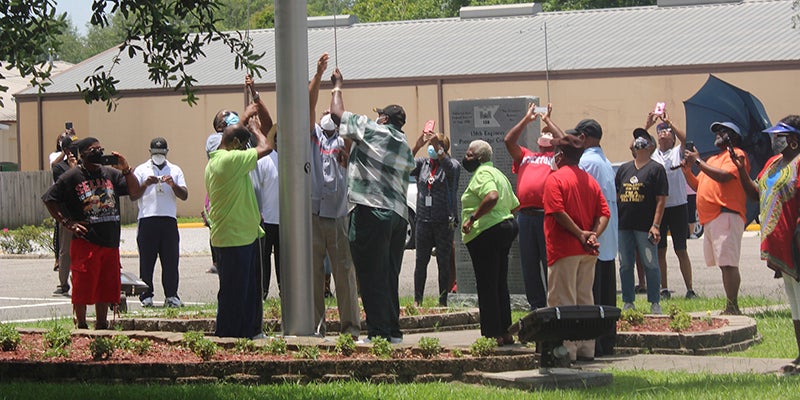General Election to determine flag, medical marijuana and statewide elections
Published 7:00 am Friday, September 18, 2020

- No longer on display: Elected officials and community members gathered at the flag pole near City Hall in Picayune to remove the state flag back in June. A replacement for that flag is on the ballot for the General Election set in November. File photo by Cathy Cook | Picayune Item
The upcoming General Election has three major measures on the ballot that will affect the entire state of Mississippi, including a change to the way statewide officials are elected, a proposed new state flag and confusing wording concerning whether to legalize medical marijuana.
Currently in Mississippi, a candidate can win the majority of the popular vote in a statewide election and not be elected into office, but voters will have an opportunity to decide if that should change during November’s election.
The Mississippi Constitution requires candidates for statewide offices to win both the majority of the popular vote and the most votes in a majority of the House districts. If no candidate meets both of those requirements, the state House of Representatives can choose a winner from the two candidates with the most votes.
The Jim-Crow era provision was enacted during the 1890 Constitutional Convention.
A lawsuit filed by seven Black Mississippi voters challenged the provision in the November 2019 elections, arguing that it violates the U.S. Constitution and the Voting Rights Act by making it significantly harder for candidates preferred by African Americans to be elected, compared to candidates preferred by white voters.
The judge in the case declined to make a decision on the issue unless the provision was triggered by the 2019 elections, which it was not. He then postponed the case so that the Legislature could consider repealing the provision in 2020.
The Legislature passed a resolution in June that would remove the electoral requirement from the state constitution. The proposed constitutional amendment also adds that if a candidate does not receive a majority vote in a race for governor or other statewide offices, the top two candidates would proceed to a runoff election.
Mississippians will be able to vote to accept or reject the constitutional amendment in November.
District 108 Representative Stacey Wilkes said she believes the proposed amendment is a good thing, because the people will be able to decide who takes office if a candidate does not receive a majority of the vote, instead of the House of Representatives. Wilkes said she believes the provision has only come up once or twice in the last 200 years.
There are two other statewide ballot measures up for consideration in November: legalizing medical marijuana and the proposed design for the new state flag.
Voters will be able to vote yes or no on whether one proposed design should become the new state flag. The design will be printed on the ballot. If voters reject the design, a new flag design will be created and on the ballot in the next statewide election.
Wilkes said she was concerned that the name of the flag design, the “In God We Trust Flag,” could create confusion. The Legislature required by law that any new flag design will include the words, “In God we trust.”
The ballot measure focused on medical marijuana is more complex than a simple “yes” or “no” and contains options that look similar on the ballot, but will have different outcomes if approved. Voters will have two questions to answer on the measure.
The first question will ask voters if they want neither measure or either measure. If the majority of voters vote for neither measure, then both initiatives will fail. If the majority support at least one of the options, the proposal with the most votes will pass.
The second question will ask if voters approve Initiative Measure No. 65 or Alternative Measure No. 65A.
Initiative 65 would allow doctors to prescribe medical marijuana for over 20 conditions, and sets a limit on the amount someone could possess at up to 2.5 ounces of medical marijuana. It also outlines the cost for medical marijuana patient ID cards, the administering agency, the deadline for cards to be issued and prohibits smoking marijuana in a public place.
Alternative No. 65A is the Legislative alternative. It does not specify possession limits, tax rates or the administering agency for medical marijuana, leaving the Legislature to set those details instead of placing them in the state constitution. The alternative measure would also limit access to medical marijuana to people who have been diagnosed with a terminal or debilitating medical condition and limits the number of state licensed manufacturers who could produce and sell marijuana products.
Wilkes said she is concerned about either medical marijuana measure passing, because they would change the state constitution. That would make it harder to change the regulations surrounding medical marijuana in the future, because amending the state constitution is more difficult than passing new legislation.
“It’s not really about whether you’re for or against marijuana. This is really close to recreational marijuana. The problem is that it’s putting this in the constitution, and once it’s in there, it’s in there,” she said.



